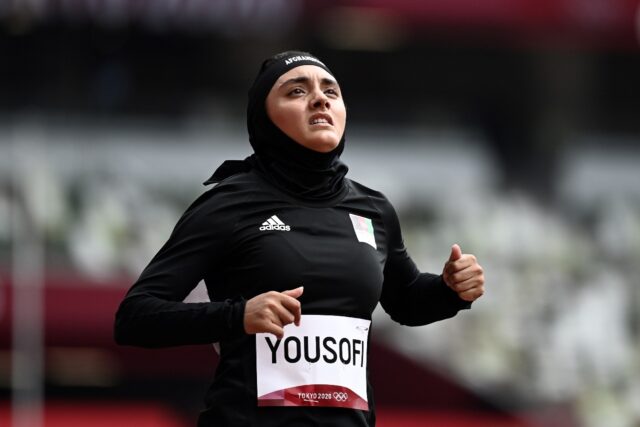Kimia Yousofi says she will be representing “the stolen dreams and aspirations” of all Afghan women after being unveiled Tuesday as one of the nation’s six-person team for the Paris Olympics.
The 100m sprinter was Afghanistan’s flag-bearer at the Tokyo Games three years ago, but fled her home country to neighbouring Iran to escape persecution when the Taliban returned to power in August 2021.
She was one of five athletes and administrators, plus families, with ties to the Olympic movement who received safe passage into Australia a year later.
“It’s an honour to represent the girls of my homeland once again. Girls and women who have been deprived of basic rights, including education, which is the most important one,” the 28-year-old said via the Australian Olympic Committee.
“I represent the stolen dreams and aspirations of these women. Those who don’t have the authority to make decisions as free human beings.
“They don’t even have the permission to enter a park.
“I’m deeply grateful to all those who have stood by me on this journey and made this possible,” she added.
A gender-balanced team of three men and three women will represent Afghanistan in Paris later this month in a symbolic move for the first summer Olympics since the Taliban took over in Kabul.
The women will compete in athletics and cycling while their male counterparts will feature in athletics, swimming and judo.
They were selected by the International Olympic Committee (IOC) in consultation with Afghanistan’s largely exiled national Olympic committee.
All of them, except the judoka, are based outside Afghanistan with the team competing under the black, red and green flag and anthem of the Western-backed former republic, which was ousted by the Taliban.
The IOC has refused to accredit any officials from the Taliban, who on Monday said they do not recognise Yousofi or her two female colleagues.
“Only three athletes are representing Afghanistan,” said Atal Mashwani, the spokesman of the Taliban government’s sports directorate, referring to the male competitors.
“Currently, in Afghanistan girls’ sports have been stopped. When girls’ sport isn’t practised, how can they go on the national team?” he told AFP.
‘Gender apartheid’
The Taliban have used their austere interpretation of Islam to erode the rights of women, who are de facto barred from sports and have restricted access to public spaces as well as education and certain jobs.
The United Nations has described the restrictions as “gender apartheid”.
The IOC banned Afghanistan from the Olympics in 1999, during the first period of Taliban rule between 1996 and 2001 when women were also barred from sport.
Afghanistan was reinstated the Olympic movement after the Taliban were ousted after 9/11 by a US-led invasion. Paris marks the first summer Olympics since the Taliban retook control.
This time the IOC has taken a different approach — approving the Afghan team under a system ensuring all 206 nations are represented, in cases where athletes wouldn’t otherwise qualify.
Yusofi’s Australian coach John Quinn will be the Afghanistan team’s head coach in France, the Australian Olympic Committee said.
He praised Yousofi, who will be at her third Olympics, as an inspiration to her training partners.
“On the track she has improved enormously technically since coming here and she has a great squad around her,” he said.
“But when you consider everything else she has had to juggle -– training, a new language, getting her family here, all those things, she has been amazing.
“Her efforts have certainly inspired the other squad members. Now she finds herself on the world stage again in Paris.”

COMMENTS
Please let us know if you're having issues with commenting.